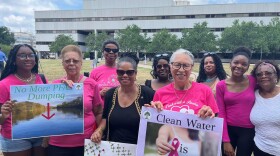Under the Trump Administration, the U.S. Department of Agriculture wants to rescind the 2001 Roadless Rule, a conservation policy that protects undeveloped areas in national forests.
The deadline to submit public comment is Friday, September 19 - three weeks after the comment period opened.
"To avoid public backlash, they've cut the comment period down to just 21 days. That's a fraction of the usual two-month-plus comment periods, and does not even compare to the 18-month public process the agency followed to create the Rule in 2001," the Sierra Club's Forest Campaign Manager Alex Craven said.
If the policy is rescinded, more than 172,000 acres in North Carolina's national forests would potentially be open to logging, roadbuilding, and other development. This includes portions of the Croatan, Pisgah-Nantahala, and Uwharrie National Forests.
"From the cool pristine mountain water that Deep Creek is known for to the elk that roam our western North Carolinian forests, roadless areas are a beautiful part of our state’s natural heritage," said Emily Mason with Environment North Carolina. "It is more important to protect these areas than to get a little more wood or to build one more mine or one more road. Let’s keep our wild forests wild.”
The Trump administration says the rule prohibits "common sense management."
“This administration is dedicated to removing burdensome, outdated, one-size-fits-all regulations that not only put people and livelihoods at risk but also stifle economic growth in rural America," said U.S. Secretary of Agriculture Brooke Rollins in a press release. "It is vital that we properly manage our federal lands to create healthy, resilient, and productive forests for generations to come.
In its filing in the Federal Register, the USDA explained rescinding the rule "is intended to return decision making for road construction, road reconstruction, and timber harvesting in inventoried roadless areas to local officials."
As NPR reports, environmental organizations argue these efforts are driven more by a desire to increase timber production in national forests than by a need to reduce wildfire risk. President Trump signed an executive order in March calling for a 25% increase in the nation's timber production.
"I think (this is meant) to support the administration's intent to place extractive logging and commercial oil drilling at the top of the priority of our public lands," said David Reid, the National Forest Issues Chair with the North Carolina Sierra Club. "It's a very short comment period, and that's one of the characteristics of this administration - trying to truncate the public participation process. What I would encourage folks to do is let their voices be known."







